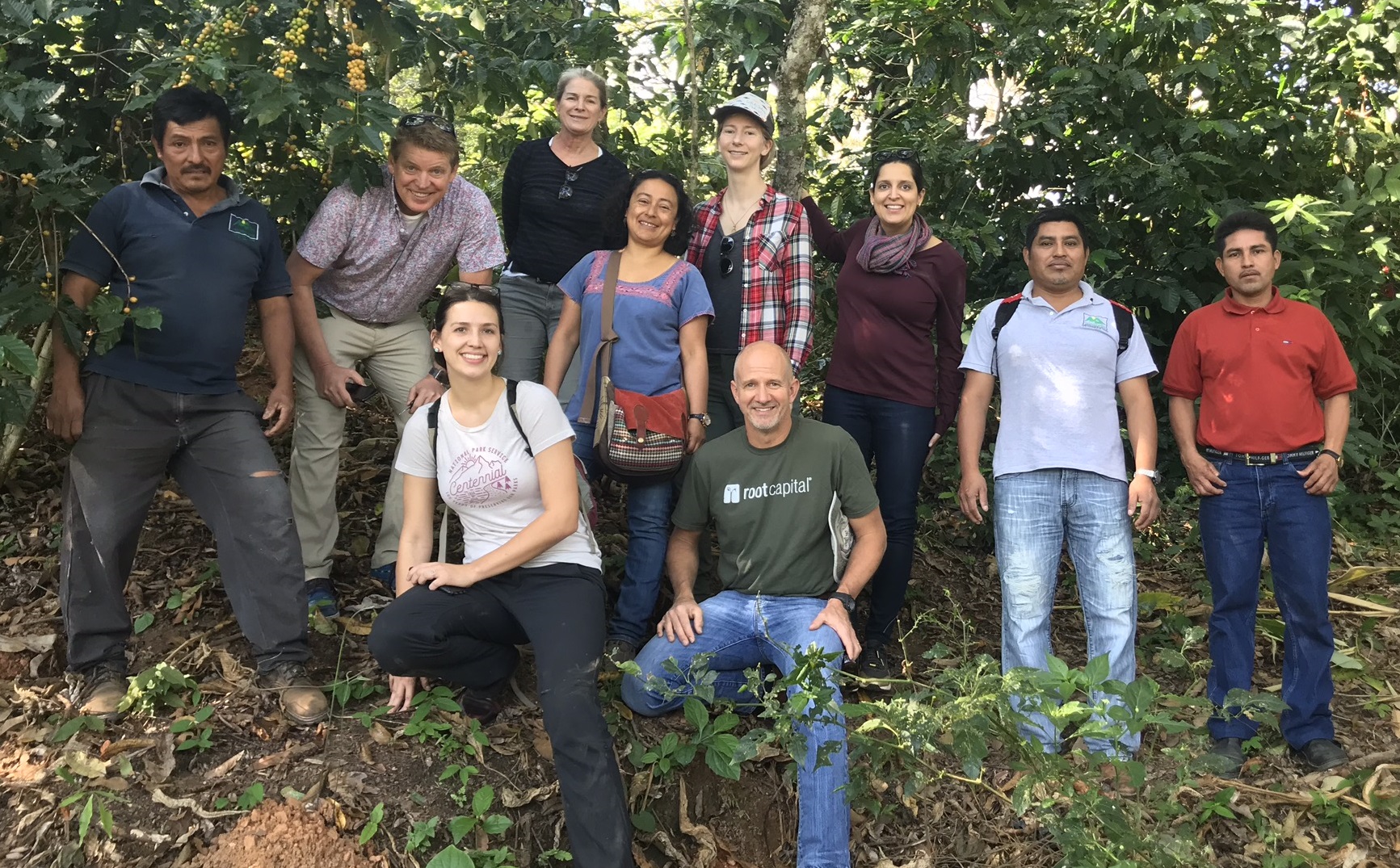
Ana Zacapa (third from right) accompanies the Root Capital team to visit client agricultural businesses in southern Mexico.
In December 2017, I was in Chiapas State in southern Mexico when Root Capital’s Senior Manager of Advisory Services for the region, David Lozano, turned to me and said: “I’m so excited she’s on our board, asking such insightful questions—and in her native Spanish!” David was talking about Ana Zacapa, who was accompanying us deep into the mountains of Chiapas to visit coffee and honey cooperatives, and to hear directly from farmers both about the challenges they face and the innovative solutions they can access as part of an agricultural business.
Ana spent the first decade of her career in investment banking, focused on the renewable energy sector and emerging markets research, before transitioning into nonprofit and foundation work. As a senior program officer at the Skoll Foundation, she led their support of social entrepreneurs focused on sustainable markets. She then became founding director of the California office for Ceres, the leading US nonprofit mobilizing Fortune 500 companies and institutional investors in support of climate and water policy action.
Today, I’m proud to announce that Ana Zacapa has been elected the new chair of our board of directors. At Root Capital, we pay close attention to “constituent voice,” listening deeply to our stakeholders, in particular the clients and rural communities we serve. Having a Honduran national, born and raised in the Northern Triangle, taking the reins of our board of directors fills me—and our whole team—with lots of excitement. Add to that her 20 years of experience in philanthropy, investment banking, and nonprofit management, and it’s clear we’re incredibly lucky to benefit from Ana’s leadership as we strive to transform more rural communities in the years to come.
I recently talked with Ana about her vision for building the resilience both of Root Capital and of the smallholder farmers we serve. Here’s what she said.
WILLY FOOTE: Like me, you began your career on Wall Street and then later moved into the social impact space. What was that transition like for you? How do you bring your private sector and nonprofit experiences together?
ANA ZACAPA: Private sector tools can be very useful in the social impact space. When people across the world have access to capital, are part of the markets, and have the right business tools, they can grow and support families and communities in ways that are transformative. However, private sector mechanisms are limited: they often ignore those with greatest need and do not focus on equity and justice. Therefore, the private sector can be complementary to social change initiatives, but it can’t replace a nonprofit sector driven by impact. Having spent many years on Wall Street and in the nonprofit space, I can see that lasting social change often requires both business and nonprofit approaches, working in tandem with local and national governments.
WF: You first got to know Root Capital as a funder, when you were our program officer at the Skoll Foundation. What stood out for you about the organization or our mission?
AZ: What inspired me most about Root Capital’s work is that you seek to transform markets so they work for all, not just for the few. You do this by demonstrating that huge segments of the world deemed “too risky” by traditional markets can thrive with the right type of capital and training. Root Capital has helped create a growing agriculture finance space dedicated to serving the capital needs of farmers in Latin America and Africa—something that was unthinkable 15 years ago! This has, in turn, helped sustain a more resilient agricultural sector in these parts of the world. And Root Capital has been able to do this not only because you share what you learn with others, but because you place the needs of your farmer clients at the center of your work.
WF: To that end…as you know, climate change is an existential threat for farmers. That’s why we partner with agricultural enterprises to build farmers’ resilience and ability to adapt to climate shocks. I know you’ve thought a lot about this issue over the course of your career, at Ceres and beyond. Where do you think we go from here, both as a sector and as Root Capital?
AZ: Yes, climate change is the existential issue of our lives. In addition to requiring a substantial transformation of the global economy, climate change is hard to address because those who are, and will continue to be, the most affected by it are oftentimes those with less power and money. And many times those who need to implement solutions on the ground are not part of the conversations at the global level. As a sector, we need to be clear that climate change and poverty are intimately linked. You cannot solve one without addressing the other. That is why I am excited about Root Capital’s work in this area—our mission has always been to partner with agricultural businesses to grow rural prosperity, and now that means deploying the financial and business tools to help farmers deal with climate threats to their livelihoods. It’s about bringing innovation to farmers on the ground that take into account both farmer’s income needs, as well as their long-term dependence on a sustainable planet.
WF: The organizations you’ve been involved with—Skoll, Ceres, Root Capital—are all deeply invested in systems change. Not just direct, meaningful impact on our different constituencies, but figuring out how to scale it up, interrupt power dynamics, and shift capital flows to generate sustainable development. Why is that so important, and what do organizations like Root Capital need in order to do systems change more effectively?
AZ: As I mentioned before, Root Capital’s approach to transforming markets and systems is what is needed for long-term change, at scale, that is not reliant on charity but is driven by those who are benefiting from change. Organizations like Root Capital need to be able to maintain their focus on impact and on the communities they serve so they can continue to demonstrate how to partner effectively with these constituencies and drive lasting change. In order to maintain their focus on impact, they need the right people, the right systems, and the right capital. Flexible, unrestricted, multi-year funding is critical for organizations like Root Capital to thrive and continue to change these broken systems.
WF: As our new board chair, what are you most excited about? What do you think are the biggest opportunities on Root Capital’s horizon?
AZ: Root Capital is poised to continue being a pioneer in its field. We continue to be uniquely positioned to strengthen agricultural businesses and move them closer and closer to being part of markets, with all the benefits that brings. We have the opportunity to lead the field in figuring out how to best provide capital to farmers to deal with climate change on the ground. And we have the opportunity to make the connection between issues of migration, opportunities for women and youth, and local resilient and inclusive agricultural businesses in places like my home country of Honduras. This is hard work, no doubt, but I am excited by the team at Root Capital and the work we are doing.

